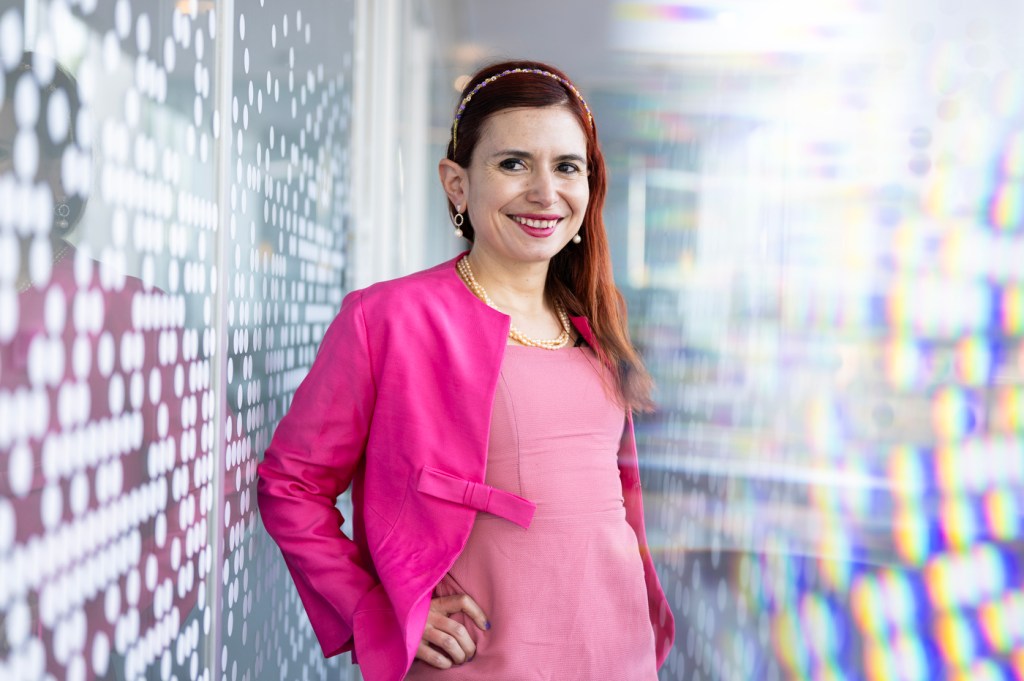How do we protect workers’ rights in the age of AI? Give the workers AI, too, says computer scientist
Assistant professor of computer science at Northeastern University Saiph Savage has received an NSF CAREER Award for her research enabling gig worker access to artificial intelligence.

A driver for a popular rideshare app receives a new request for a ride and adds it to their queue. They drive to the pick-up location, park at the curb and wait five minutes for the riders to show up.
None of this is paid labor, says Saiph Savage, assistant professor in the Khoury College of Computer Sciences at Northeastern University. While this amount of time may not seem like much — in this example, at least — it adds up.
Savage says that gig-working platforms have the expectation of unpaid labor built into their design. She wants to help gig workers better understand not only how unpaid time factors into their earnings, but also how the burgeoning field of artificial intelligence is impacting their jobs and how AI can be leveraged to their needs.
For this work, Savage has received an NSF CAREER Award to design “AI-enhanced tools for supporting gig workers and especially their collective action,” she says.
The first step, Savage says, is “giving workers access to their own workplace data.” Often, unless they track it themselves, gig workers won’t have a picture of how many hours they’ve worked to compare against their earnings.
Problems might not only lie with pay, she says. “In gig work you usually have algorithms that are also mediating your labor,” she says. “They’re also mediating, for example, what work do you get shown? What work do you not get shown?”
This can have a sizable impact on just how many gigs a worker receives in a given period.
Featured Posts
Further, without access to their own data, it’s hard for gig workers to know if the problems that arise — with pay or with other aspects of their jobs — might be simple one-off errors or might be something more systematic, she says.
After data access comes access to artificial intelligence itself. “I’m giving them access to interfaces so that they can visualize their problems,” Savage says. These “AI interfaces can guide them to execute the solutions.”
But these solutions won’t be directives handed down by a decision-making artificial intelligence. Rather, Savage says, what’s important is that human judgment be incorporated into the process with AI supplying insights and suggestions for the issues the gig workers have identified.
In addition to providing AI-guided insights, Savage will also teach “workers how AI might impact the workforce. This is important,” she says, because artificial intelligence is often incorporated into workplaces without consideration for “the harms that the AI can cause.”
To combat this, Savage wants “worker unions, worker collectives and individual workers to be very much aware about the different aspects of AI so that they can speak up when they have uneasiness about a particular technology.” Staying on top of technological innovations is a challenge unto itself, she says, as “they’re constantly evolving.”
In terms of outreach, Savage says that Seth Harris, distinguished professor of the practice in the Northeastern University College of Professional Studies, “has been connecting [Savage’s team] at the national level” with worker organizations.
“Additionally,” Saiph continues, “I’ve been working with the Global Partnership on AI. This is an intergovernmental organization, each country sends off its experts to work together — I’m part of this organization from Mexico’s federal government.”
“So we’re studying, How is AI used globally across the world? And we’re accessing workers across the world.”
Savage will leverage Northeastern’s global presence to conduct this research. “I want to visit the whole East Coast” collection of campuses, she says, including Northeastern University Oakland and Seattle.
Savage’s research won’t stop in the United States, either. “Currently I’m working with the Vancouver campus,” she says, “teaching rural workers about how they can integrate AI.”
She has also been collaborating with the National Autonomous University of Mexico “so that we can reach Mexico and other countries in Latin America,” she says.
“As academics,” Savage says, “it is important that we take on this role of connecting with governments [and] policymakers who can really help to shape how we’re thinking about AI right now.”











